> Jump to the update: “Alpha Skills: the first International Meeting in Morbegno, Italy”
> Jump to the update: “Alpha Skills: the second International Meeting in Vicenza, Italy”
> Jump to the update: “Alpha Skills: the fourth International Meeting in Ghent, Belgium”
What for
To customize the materials developed in WP2 to suit the specific local contexts of each partner organization and country, so teachers, educators, and youth workers can be trained on effectively utilizing these materials while enhancing the knowledge and skills in co-creating new methodologies through participatory methods, focusing on social and work skills.
How
By developing international co-creation workshops, with one workshop dedicated to each partner country. During these workshops, teachers, educators, and youth workers from each country will collaborate on adapting the developed materials to meet their unique local needs.
Outcome
As a result of WP3, the project will produce qualitative methodologies and tools focused on career guidance and the green economy, specifically tailored to the reality and needs of teachers, educators, and youth workers in each partner country.
Alpha Skills: the first International Meeting in Morbegno, Italy
With the first international meeting (WP3), held from March 19 to 22, 2024, in Italy, Alpha Skills has made a significant step forward in achieving its set objectives. The gathering in Morbegno (SO) brought together all project partners, including members of their respective Communities of Practice (CoP) from Vicenza, Belgium, and Romania. The aim was to strengthen the collaborative network and delve into strategies for implementing activities.
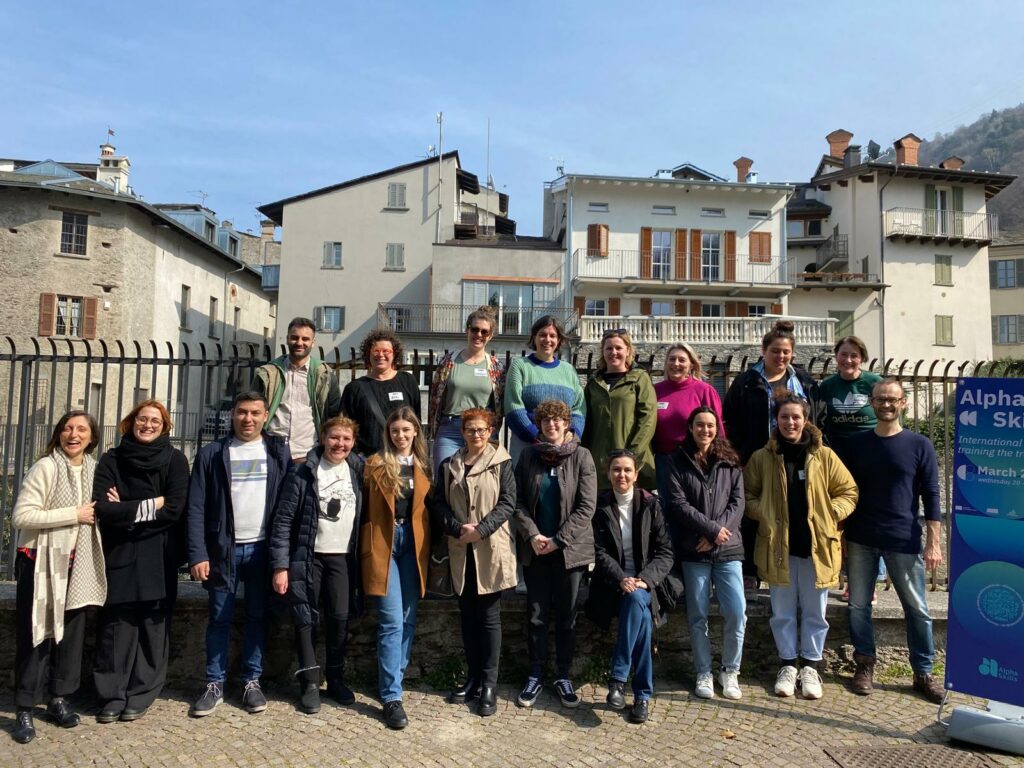
Meeting objectives
The international meeting in Morbegno focused on three key objectives:
- Presentation and discussion of Local Co-Creation results: sharing experiences and best practices from the initial local co-creation activities using the #FutureMe methodology.
- Open discussion on the EU’s Green Comp Document and Green Skills: reflecting on the essential competencies for a sustainable professional future, with the goal of integrating these concepts into project activities.
- User Content Generation (UGC) Activity: creating video interviews and defining the related social media editorial plan.
A program rich in activities
The meeting featured a series of interactive activities, some specifically for the CoPs and others designed for the partners:
- Sharing local testing experiences and results: the meeting began with a day dedicated to sharing experiences and results from the first local testing method. Members of the Lombardy Community of Practice (CoP) presented the local co-creation process, including test results from schools and after-school services, providing a detailed overview of the challenges faced and successes achieved.
- Training on the #FutureMe Green Edition Methodology: the second day focused on training participants on the #FutureMe Green Edition methodology, developed by Studio SHIFT. During the morning session, participants explored the tool’s features and potential applications, discussing ways to improve and adapt it to their specific cultural and professional contexts. The kits, already translated into English, were used to gather valuable feedback essential for further refining the methodology.
- Prototyping workshop and communication activities: in the afternoon of the second day, a prototyping workshop was held where participants actively collaborated to design adapted versions of the #FutureMe tool. Concurrently, a communication activity was conducted to prepare for the UGC campaign planned for the project, involving the creation of video interviews and other participatory activities.
- Planning the next steps: the final day of the meeting was dedicated to planning the project’s next steps. Partners discussed lessons learned during the meeting, planned the next TtheT in Vicenza – focused on the Bootcamp methodology – and reviewed financial aspects. A plan for upcoming regular meetings and ongoing activity monitoring and evaluation was also developed.
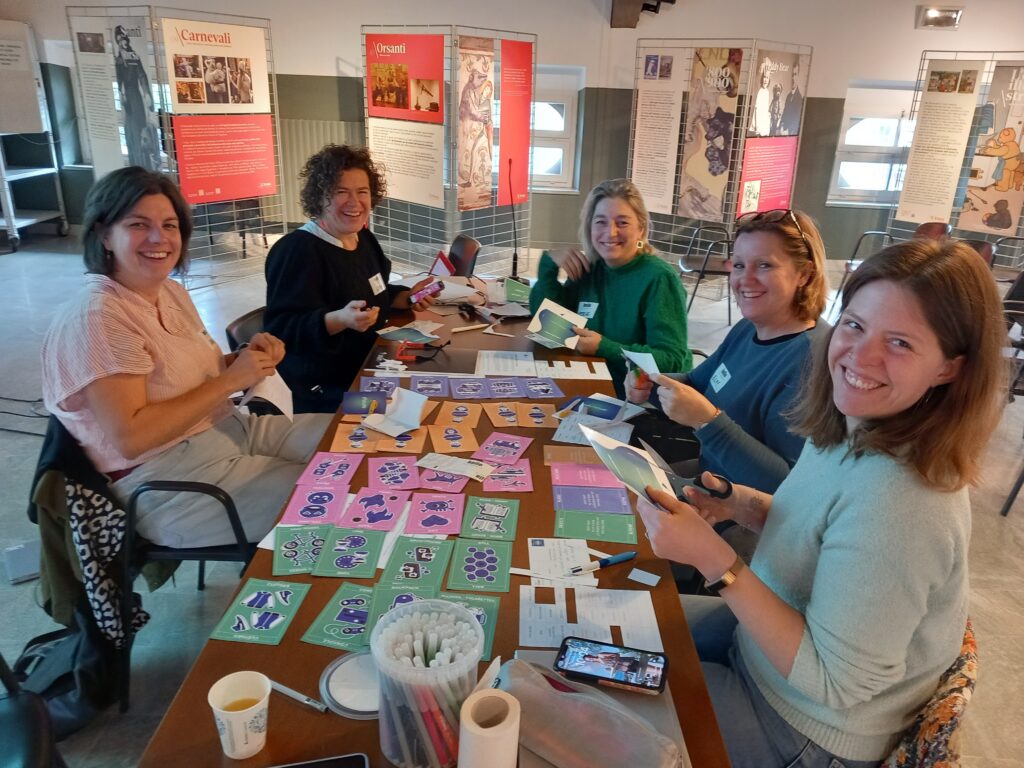
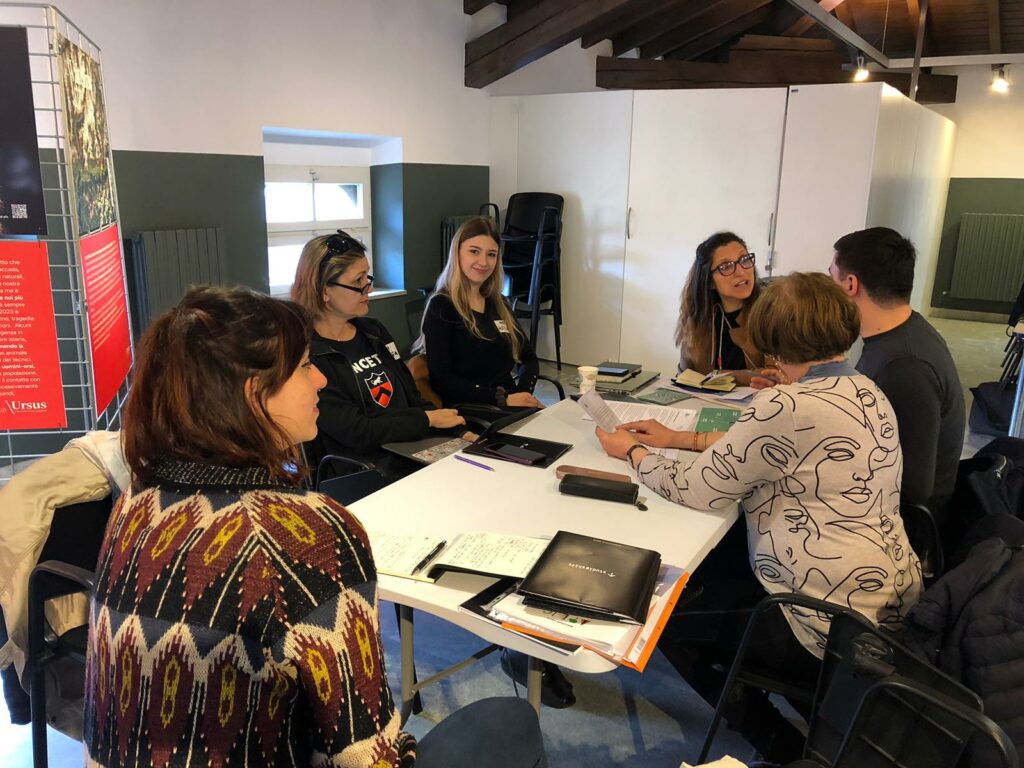
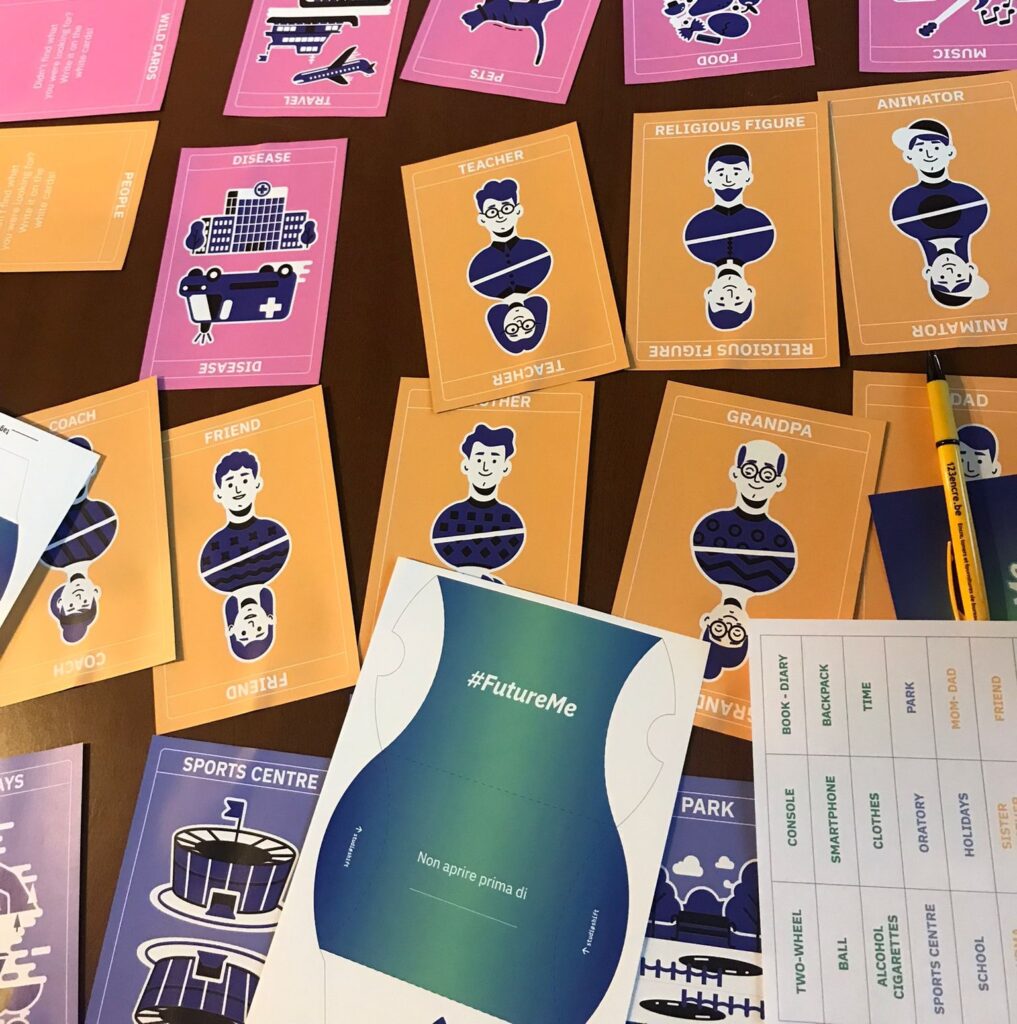
Conclusions and future prospects
The first international meeting was successful on many fronts. Thanks to the contributions of all involved partners, the Alpha Skills project continues to progress toward its goals, offering new growth and development opportunities for young people in local and international communities.
The meeting highlighted both the challenges and resources of this ambitious project: on one hand, the difficulty of using guidance and training tools and methodologies from diverse social and cultural contexts; on the other hand, the conviction that there is always something to learn when fundamental values for Europe’s present and future, such as respect and curiosity for what is different and new, underpin actions.
As envisioned by the project, partners returned home with the objective of testing the newly acquired methodology, using tools appropriately translated by Studio SHIFT, and sharing the results observed in their specific training and guidance contexts.
Looking ahead, the next meeting, organized by Cooperativa Margherita, will be held in Sandrigo (VI) from October 22 to 24, 2024. It will focus on the Bootcamp methodology, continuing the development and implementation of green skills across Europe.
Alpha Skills: the second International Meeting in Vicenza, Italy
The second international meeting (WP3) took place from October 22 to 24, 2024, in Vicenza, Italy, organized by the partner Margherita Società Cooperativa Sociale. All partners participated along with
members of their Communities of Practice (CoP). The purpose of the meeting was to present and disseminate the “Boot Camp” methodology.

Meeting objectives
The international meeting, like the first meeting in Morbegno regarding the #FutureMe methodology,
focused on three key objectives:
- To share with all participants the knowledge of the original Boot Camp, developed by Margherita Cooperativa in 2018, which has been used over time to support youth orientation in the area;
- To present the journey that led to the development of the adapted Boot Camp, detailing the various phases of the project and involving testimonies from those who contributed to its realization. Additionally, to include insights from experts who have played a role in various editions of the original Boot Camp;
- To experiment with both versions of the Boot Camp with different country groups to help them understand the methodology and explore how to apply it in their own contexts, reflecting together as a group.
A program rich in activities
The meeting was characterized by a series of frontal presentation activities and other more interactive ones:
- Presentation of the original Boot Camp, through a promotional video that described the implementation of this experiential methodology. This allowed for the involvement of experts in the green sector and beyond, who shared their testimonials after participating in previous versions of the original Boot Camp in the Margherita Cooperativa area. In addition, a testimonial from one of Margherita’s educators, who regularly implements the Boot Camp, was shared with the participants.
- Presentation of the adapted Boot Camp (Boot Camp Pills), introducing the process used to develop this version: 3 local co-creation sessions with educators, psychologists, and professionals working with young people. Two participants explained their involvement in these sessions.
- Training for the Boot Camp: it was carried out in two phases. The first phase allowed participants to plan the implementation of the original Boot Camp in their contexts, considering their available resources (e.g., budget, human resources, timing). The same approach was applied to the Boot Camp Pills. In this way, partners and participants began adapting the Boot Camp, organizing the subsequent testing phase in their countries.
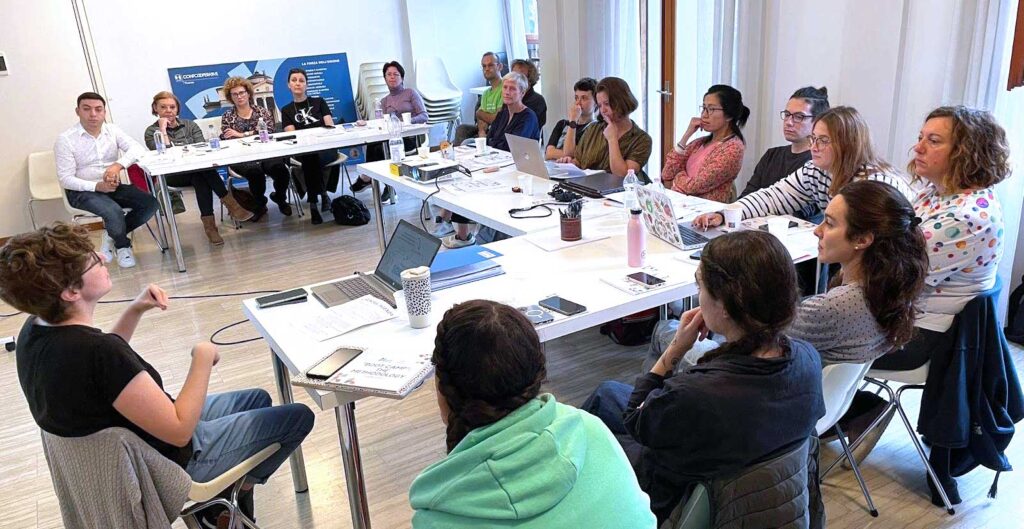
Conclusions and future prospects
The second international meeting was held, focusing on the Boot Camp methodology. This methodology, in both versions (original and pills), is entirely experiential for young people. The meeting served as a great starting point for participants and partners to understand how to implement the other aspects of the project (WP4), test the methodology, and adapt it to their contexts and organizations. In addition, this allowed for a focus on the methodology with a green perspective. Specifically, partners returned home with the objective of testing the newly acquired methodology, using indications gave by Margherita Società Cooperativa Sociale, and sharing the results observed in their specific training and guidance contexts.
Looking ahead, the next meeting, organized by Imago Mundi, will be held in Bucharest and Pitești from April 1 to 3, 2025. It will focus on their methodology, continuing the development and implementation of green skills across Europe.
Alpha Skills: the third International Meeting in Pitești and Bucharest, Romania
From April 1 to 3, 2025, the Alpha Skills project reached a new milestone with its third international meeting, hosted by Imago Mundi in Pitești and Bucharest. The event gathered all project partners and members of their Communities of Practice (CoP), continuing the journey of co-creation and testing innovative methodologies for career counseling and youth guidance.
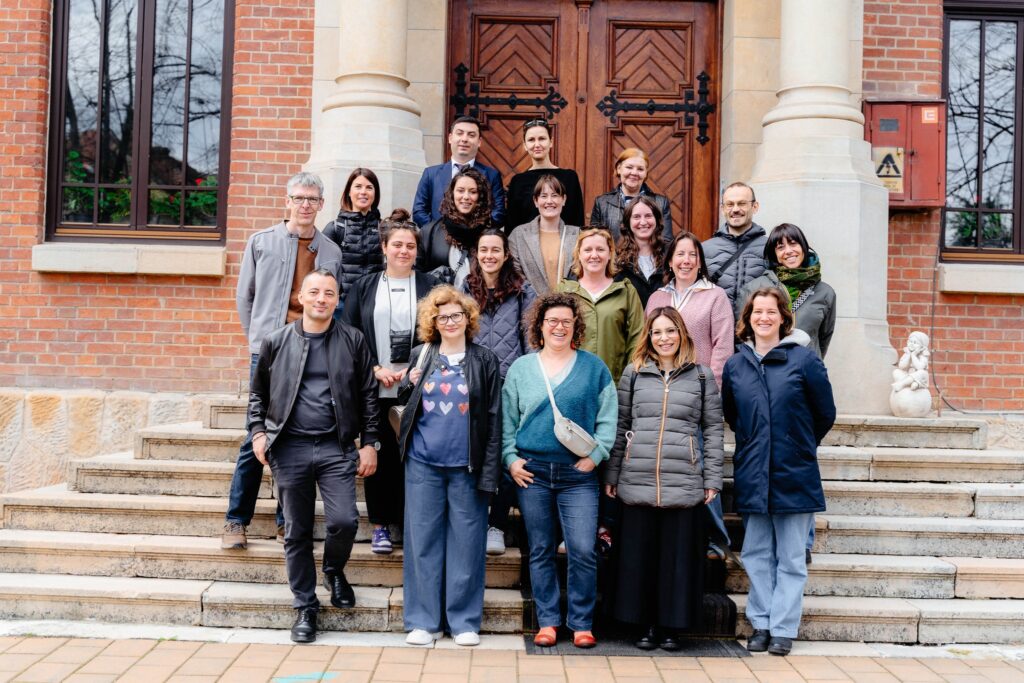
Meeting objectives
The international meeting in Romania pursued three main objectives:
- Testing and refining the Imago Mundi non-formal Career Counseling Guide: partners explored both sections of the guide—self-directed worksheets and trainer-led team activities—through practical sessions and student feedback.
- Highlighting local co-creation results: voices of students and educators who had tested the guide in schools were brought to the forefront, offering insights into its adaptability and impact.
- Strengthening collaboration and planning: beyond methodology testing, the gathering served as an opportunity to reflect on project progress, align strategies for the next phases, and deepen intercultural exchange among partners.
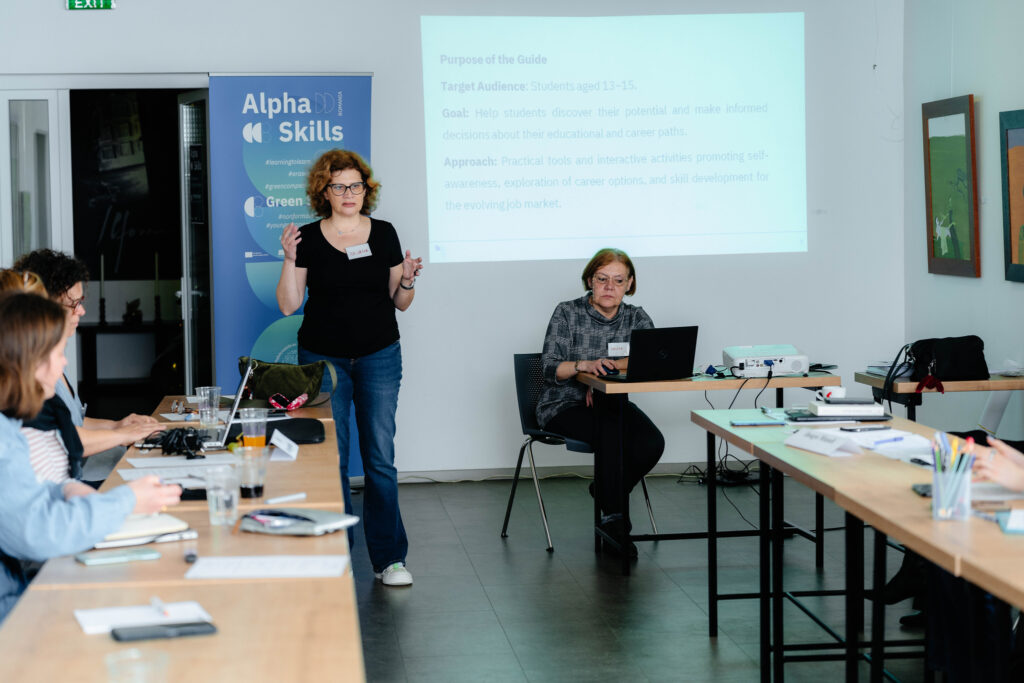
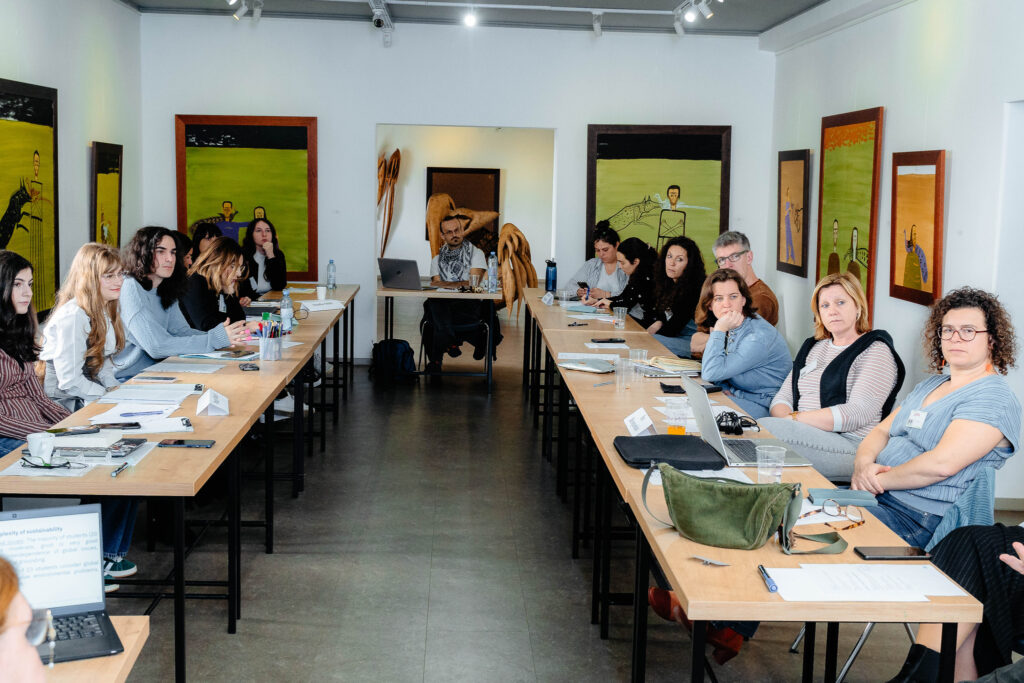
About the activities
Over three days, participants engaged in a structured program across symbolic cultural and educational venues in Pitești and Bucharest.
- Day 1 – Pitești: Imago Mundi and the Non-formal Guide
The meeting opened at the Ilfoveanu & Badea Cultural Foundation, a prestigious art hub in Pitești. After introductions and an overview of the agenda, Imago Mundi presented the local co-creation process and shared voices of students who tested the Boot Camp methodology. The morning concluded with the presentation of the Career Counseling Guide and its first testing phase, followed by interactive Q&A.
In the afternoon, partners continued experimenting with the first part of the guide through hands-on exercises, before enjoying time to network and explore the city. - Day 2 – Pitești to Bucharest: Testing with Students
The second day deepened the testing process, beginning again at Ilfoveanu’s Galleries and moving to Ion C. Brătianu National College. Here, students actively participated by sharing their experiences of the guide, especially the second part which emphasizes teamwork and trainer-facilitated exercises. Their testimonies highlighted the relevance of 21st-century skills such as collaboration, flexibility, and critical thinking.In the afternoon, participants departed to Bucharest, where informal discussions continued. - Day 3 – Bucharest: Study Visit and Management Session
The final day featured a study visit to Destiny Park, an innovative experiential center designed as a miniature city where young people explore real-world professions through play. The visit reinforced the project’s focus on experiential learning and career orientation.
In the afternoon, partners held a dedicated management session to evaluate progress and plan the upcoming phases of the project. The meeting concluded with a farewell dinner at the iconic Caru’ cu Bere restaurant, marking the cultural and symbolic closure of the Romanian event.
Conclusions and future prospects
The event emphasized the importance of combining student voices, trainer expertise, and innovative spaces like Destiny Park to reimagine how young people can be guided toward meaningful career paths.
Alpha Skills: the fourth international meeting in Ghent, Belgium
From 16 to 18 September 2025, the fourth International meeting in Ghent, Belgium took place. The event was hosted by Het Beroepenhuis and offered a final opportunity to gather all project partners and members of their Communities of Practice.
The meeting was held to introduce all partners to three new methodologies; serious game Fest It Up! and two educational installations regarding renewable energy, Sun and Wind Energy Lab.
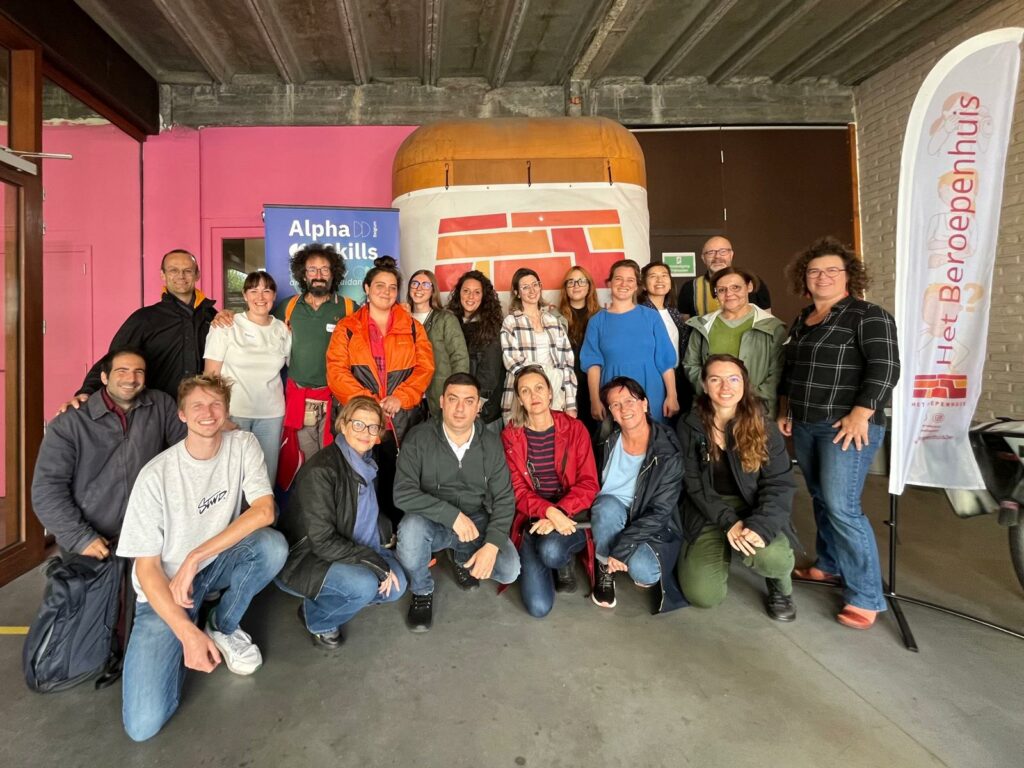
Meeting objectives
The international meeting in Ghent focused on three key objectives:
- Presenting and experiencing the three methodologies developed by Het Beroepenhuis. Partners were introduced to the new tools through a range of presentations and workshops.
- Adapting the methodologies to the local context through a variety of brainstorm exercises, to prepare all partners for the testing phase in each Community of Practice.
- Looking and planning ahead at the final leg of the AlphaSkills project. We took the time to organize a staff meeting to make arrangements and double down on our timeline regarding the Guidebook and the final dissemination event in Romania.
An abundance of experiences
On our first day all partners were introduced to the activities and mission of Het Beroepenhuis as well as to each other. After the introductory phase the development and concept of the Fest It Up! methodology was presented. Our meeting space was then transformed into an experiential workshop, where all partners were immersed in the Fest It Up! workshop and serious game. During the workshop, they learned more about circularity, R-strategies in the form of fan bases and organizing their own festival. At the end of the workshop, each group presented their sustainable festival through a pitch. By experiencing the methodology, all partners shared their feedback on the methodology, this gave us the opportunity to look at improvements that can be made to Fest It Up!
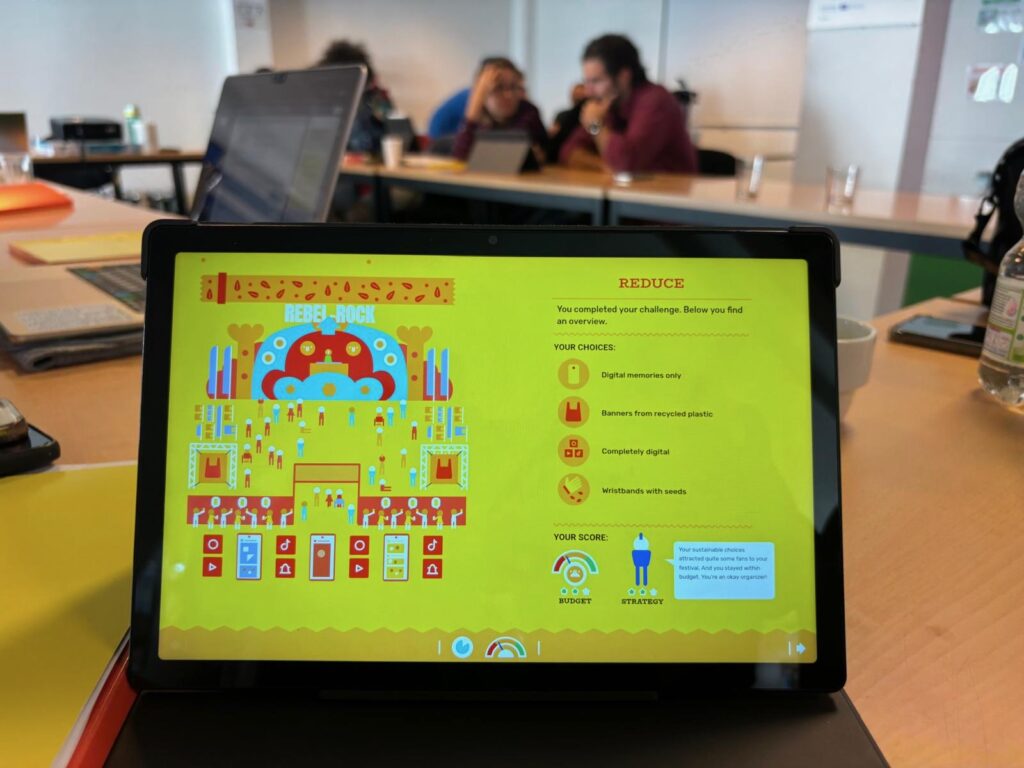
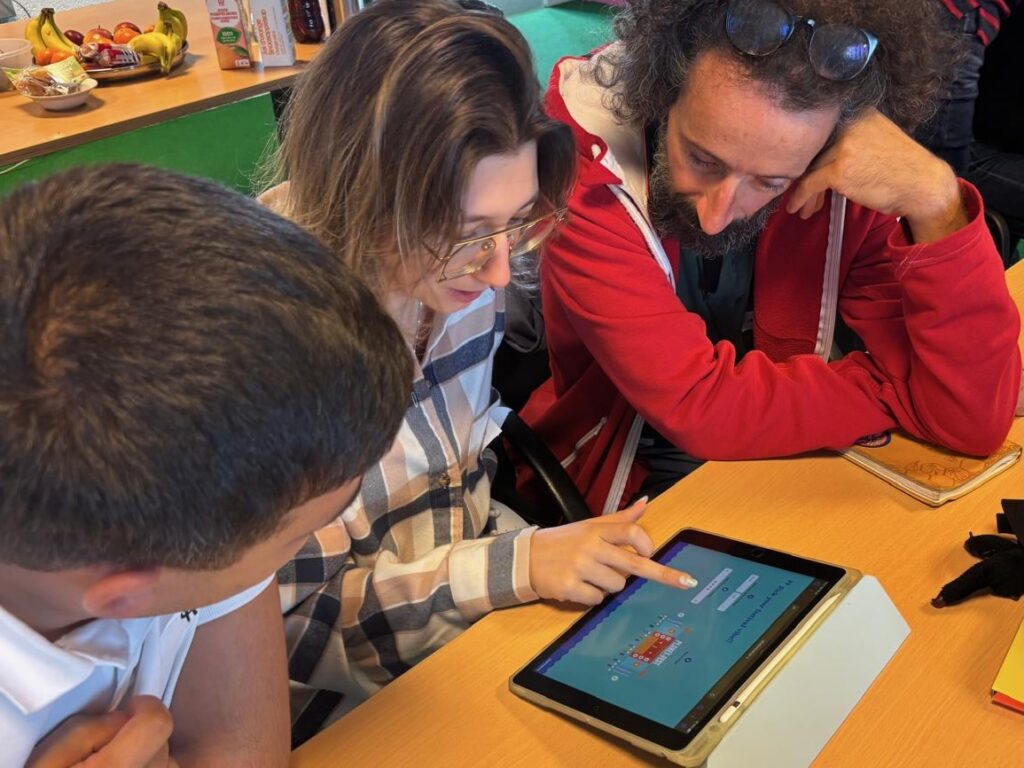
Day two Het Beroepenhuis presented the how/what/why of the Sun and Wind Energy Labs, these are innovative educational labs that can be transported and used in both non-formal and formal environments. The Labs are combined with activity cards at different levels and a manual for the chaperone. After the introduction of these methodologies, all partners explored the use of the Labs independently, while also being able to ask questions.
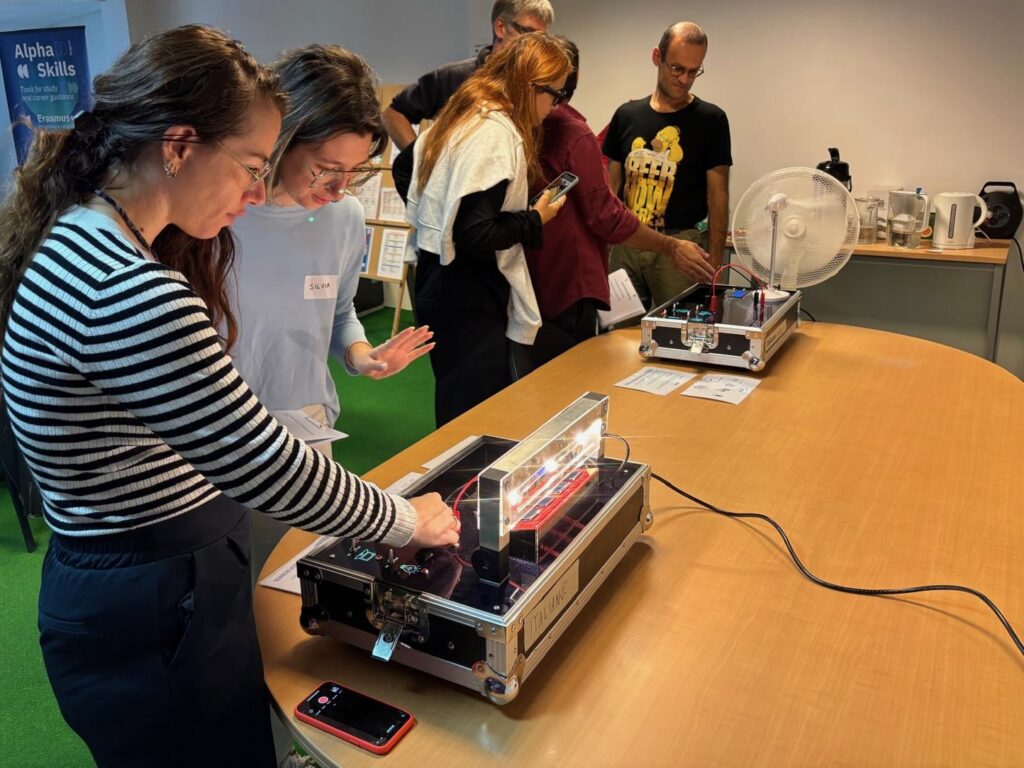
The afternoon kicked off with a visit to a local Flemish partner; our colleagues at the Province of Antwerp. They brought the Technotrailer, a mobile educational trailer designed to spark interest in STEM (Science, Technology, Engineering & Mathematics) among primary school students. It’s a fully equipped truck that transforms into a hands-on learning space filled with interactive experiments and technology demonstrations. The Technotrailer introduced the different experiments and the origin of the Technotrailer, whereafter partners experienced the activities in the Technotrailer. To end the day, we held a round of feedback on the Sun & Wind Energy Lab and shared ideas on how to improve them.
On the final day we took the time to deep dive in several of our previous ideas for adaptations and improvements of the methodologies. Each organization split into two groups and chose an adaptation that they wanted to continue working on. This resulted in a presentation of adaptations such as adding experimental activities to the Sun & Wind Energy Labs, making the existing activity cards more inclusive through visualisation and integrating even more Green Skills into the Fest It Up! workshop.
In the afternoon a productive staff meeting was held as well as an educational tour of Ghent. Our final hours together were spent during a farewell dinner and a small diploma ceremony.
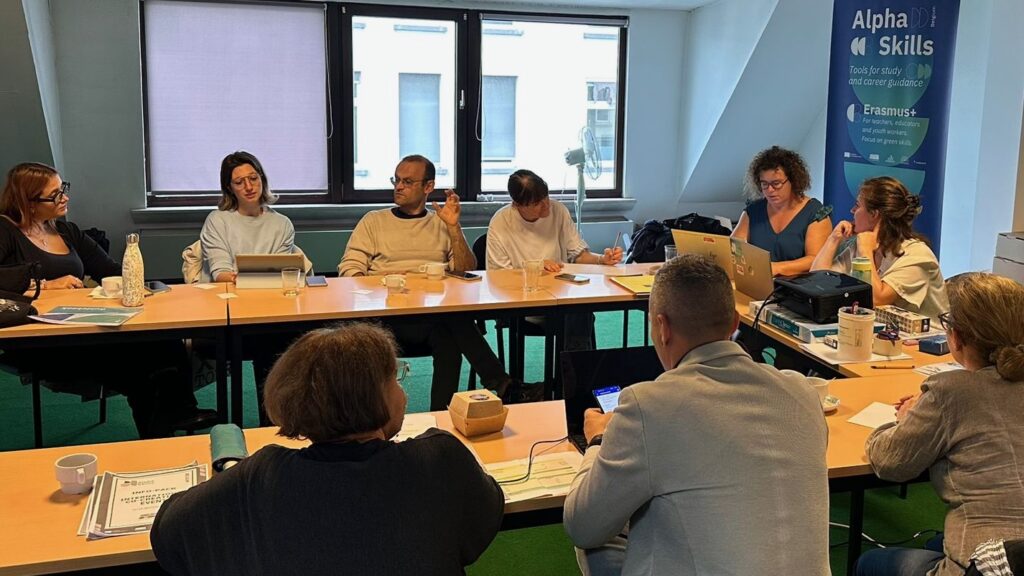
Where we stand and where we’re going
The fourth and final training event proved to be very productive in sharing and adapting new methodologies. We look forward to learning more through testing the methodologies in both Romania and Italy. Afterwards, we will summarize the adaptations and share all methodologies through the AlphaSkills Guidebook.
During the final months of the project we will be focusing on delivering a very informative Guidebook as well as disseminating the AlphaSkills project on an even broader European level.